NEWSLETTER – November 3, 2023
Greetings!
I hope you’re enjoying this great fall weather and had a festive Halloween. My 15-year-old son and his friends had an udder-ly great time dressing up as inflatable cows for Halloween!

With both my kids now in high school, I’m often impressed with the things they’re learning. Recently my 10th-grader brought home an essay about the importance of reading. It said (and I’m paraphrasing), “the quality of our reading stands as an index to the quality of our thought. If we want better thinkers, we have to build better readers.”
Inspired by that notion, I’d like to invite you to join the inaugural 38th District Book Club, themed “Our California!”
Together, we’ll read books that impact and reflect on the California experience – past, present and future. I envision us delving into a broad range of topics about our state, such as our immigration stories, the history of our development and business patterns, and possibly water and transportation policy. And, of course, the people behind it all.
I’ve participated in several book clubs over the years and found that the best ones are those where we all read the book (instead of just socializing!), and then discuss it through guided analysis. This critical approach leads to greater empathy for other’s experiences, insight about new topics and an expanded knowledge base.
For some, making the commitment to read a full book can seem difficult in this era of high-quality television, social media scrolling, and bite-sized newspaper, magazine or blog articles. People between the ages of 15 and 44 are more likely to watch television than read a book, according to statistics about Americans’ habits. And one in three teenagers has not read a book for pleasure in the last year. But the rewards of reading books are worth the effort. Snacks are fine, but we all know there’s nothing like a nutritious, sumptuous meal!
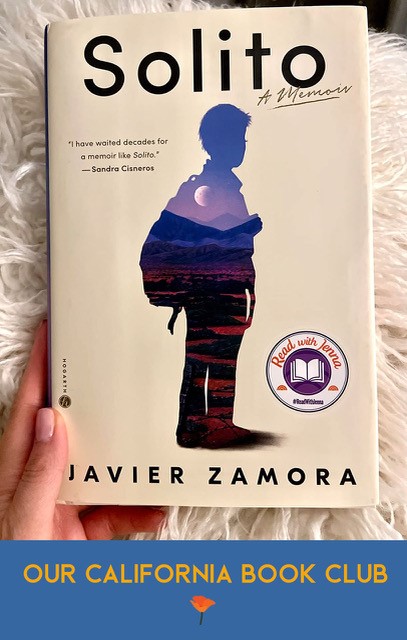
The first book we’ll read is the New York Times bestseller, Solito, A Memoir, by Javier Zamora. He compellingly tells his story of being an unaccompanied 9-year-old migrating from El Salvador to California in 1999. As Javier says in this interview, this isn’t a horror story – it’s his account of humanity, bravery and perseverance.
We’ll hold our first one-hour book club meeting on Zoom on Saturday, January 6 at 11 a.m. If you’d like to join us, please click here to add your email and receive direct correspondence about the 38th District Our California Book Club!
I’m really looking forward to exploring some stimulating literary works with you!
P.S. If you have any recommendations for additional California-related books we should put on the list, please share in the notes section of the link above.
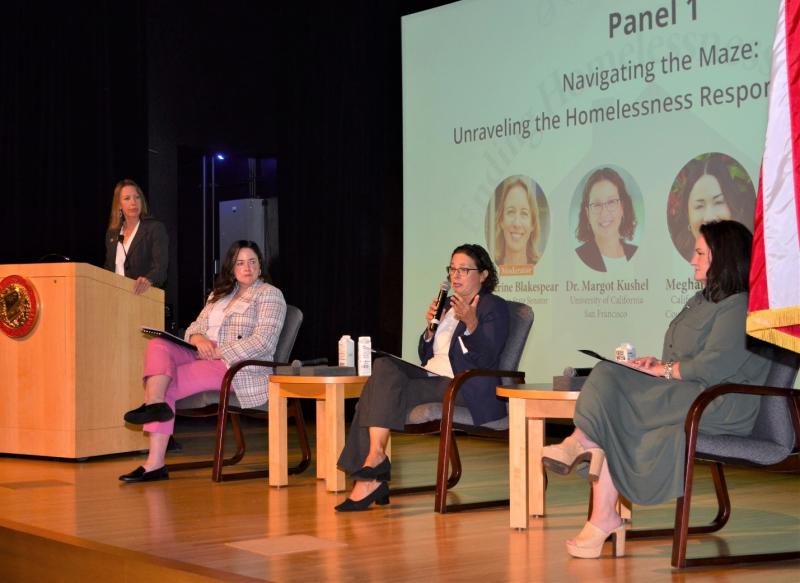
We started the summit off with Dr. Margot Kushel of UCSF talking about her study – the largest, and most comprehensive homelessness study in the last 30 years.
Addressing homelessness is one of my top priorities. As I said in my opening remarks, for residents throughout the state of California homelessness continues to be the number one issue. The Public Policy Institute of California found that 70 percent of Californians say that homelessness is their biggest policy concern.
I am constantly thinking about how we can tackle this problem, which has become a humanitarian crisis growing worse every passing month, despite increasing amounts of money and attention.
For the 18th month in a row, the number of people becoming homeless in San Diego County outpaced the number moving into homes. In September, 1,195 San Diegans became homeless for the first time, and 776 exited homelessness.
The state has spent more than $17 billion on homelessness programs since 2018. This money has helped more than half a million people through constructing new units, preserving old ones, converting hotels and motels, building shelters, and setting up permanent supportive housing facilities with on-site services.
I held an Ending Homelessness Summit to focus energy, time and attention on this important topic. We streamed this discussion live on the internet, and I welcomed questions and bill ideas. And I’m glad to say, we got lots of feedback that I am carefully considering.
The event was well attended, drawing more than 100 people to the Carlsbad City Library, with many more tuning in online.
In my first year in the Senate, I prioritized legislation to help reduce homelessness and increase affordable housing. I am a member of the housing committee, and the first bill I introduced was SB 7, which would have required every city and county to create homeless-serving housing based on their Point In Time (PIT) Count number of homeless residents. The bill did not make it through the committee process, and I am still working on it.
I was the Mayor of Encinitas for six years before being elected to the Senate, and I certainly understand the tension that exists between the different levels of government when it comes to addressing a problem as complex as homelessness.
Here are the highlights from our panel discussions.
Panel 1 — Navigating the Maze: Unraveling the Homelessness Responsibility Riddle
Moderator: State Senator Catherine Blakespear
Panelists:
- Dr. Margot Kushel MD, Director of UC San Francisco Benioff Homelessness and Housing Initiative, University of California San Francisco
- Meghan Marshall, Executive Director, California Interagency Council on Homelessness
- Tamera Kohler, Chief Executive Officer, San Diego Regional Task Force on Homelessness
Key Points Made
- People are not moving from other places to be homeless; this is a homegrown problem.
- The underlying cause of homelessness is the lack of housing. You can accurately predict the amount of homeless in a community by examining the disconnect between the cost of housing and the salary from low-income earners there.
- The comprehensive UCSF study of homelessness released in June found that in the six months prior to becoming unhoused, the people who became unhoused had a median household income of $960 a month. The median cost for a studio apartment in California is $1,500. Aside from the economics, many had other problems, such as substance abuse or mental health needs.
- This homelessness problem is solvable. As a proof in point, the federal government invested heavily to reduce homelessness among veterans and has cut it in half over the last decade. They have followed the housing first philosophy.
- In the U.S., we’ve relied on the private housing market and used vouchers to subsidize housing for low-income people. There appears to be no political appetite in the U.S. to pursue larger-scale public housing as a solution to the problem.
- Only one-quarter of people eligible for housing vouchers get them. If the federal government provided them for everyone who qualified, it would be transformational and solve the problem in many parts of the country.
- It will be hard to solve this problem without the federal government getting heavily involved because of the scope and scale necessary.
Panel 2 — From NIMBY to Neighborly: Bridging Divides for Homeless Solutions
Moderator: San Diego City Councilmember Joe LaCava, District 1
Panelists:
- Stephen Russell, President and CEO, San Diego Housing Federation
- Lisa Jones, Executive Vice President of Strategic Initiatives, San Diego Housing Commission
- Kelsey Brewer, Senior Director of Business Development, Jamboree Housing Corporation
Key Points Made
- There is a great book, “Homelessness is a Housing Problem,” which walks through the data showing it’s primarily a supply problem.
- The market naturally works to create supply for higher-income earners. Many developers make money by buying low-rent apartments, refurbishing them and then turning around to charge much higher rent for them.
- With a shortage of housing, it’s like a game of musical chairs. In a game of musical chairs, who misses out? The guy with a broken ankle. With a shortage, the most vulnerable people are shut out of housing.
- To overcome NIMBYism, you need to educate the community and engage it to counter misconceptions and make sure people understand the need.
- Cities should be forced to make sure there is housing for people working inside their cities. The City of Coronado was used as an example. A panelist shared that the Hotel Del Coronado employees about 1,200 staff and none of them are paid a wage that allows them to afford rent in Coronado. Workers create tremendous wealth for the city by drawing tourists there and they personally report to work after long commutes or living out of their cars.
- We should go the next step and engage large employers. We need public-private partnerships, and large employers should be helping to create housing for their workforces. Perhaps commercial developers could be required to include housing as part of big commercial developments.
- For communities against building affordable housing, you have to ask them what services do you want to go without. Do you want to go without restaurant workers, hotel workers, mechanics, carpenters or in-home nurses?
Panel 3 — Paths to Progress: Homelessness Policies in a Polarized World
Moderator: State Senator Catherine Blakespear
Panelists:
- Mark Stivers, Director of Advocacy, California Housing Partnership
- Betsy Brennan, President and CEO, Downtown San Diego Partnership
- Joe LaCava, San Diego Councilmember, District 1
Key Points Made
- San Diego County’s 18 cities and the county should be working together to address homelessness, and not pushing homeless residents into neighboring cities.
- San Diego’s Unsafe Camping Ordinance prohibits camping in sensitive public areas such as near schools, along transportation corridors, in city parks where there are health and safety risks, and in open space. What was important was making sure the city had housing and shelter to meet the needs of people who are homeless, a place for all unhoused to go before enacting the Unsafe Camping Ordinance. If there are suitable shelter options, the unhoused must use them, under the ordinance.
- More and more state legislators are making addressing affordable housing and homelessness a top priority, which is creating new momentum.
- The state budget used to have very little funding for affordable housing, but in recent years, both good budget years and bad ones, it has included significantly more money for it. And that funding will likely grow.
- We need to continue to look for opportunities, such as using old military barracks for affordable housing, or working with private property owners to utilize unused land or facilities.
- The courts say cities can’t ban people who are unhoused from camping or living on the streets, if they don’t have other places for them to go. (Determined in the Martin v. Boise case.)
- The Governor has put an $8 billion general obligation bond on the March ballot to fund permanent supportive housing and provide treatment facilities for people who are homeless.
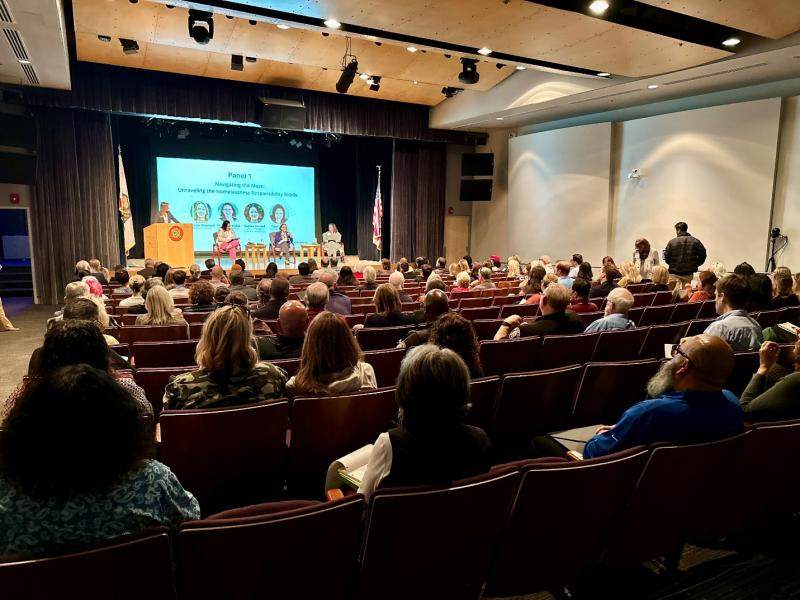 The summit was streamed live on the internet and recorded.
The summit was streamed live on the internet and recorded.
Video of the Event
If you couldn’t attend the summit or watch it online, you can watch a recording of the entire summit here.
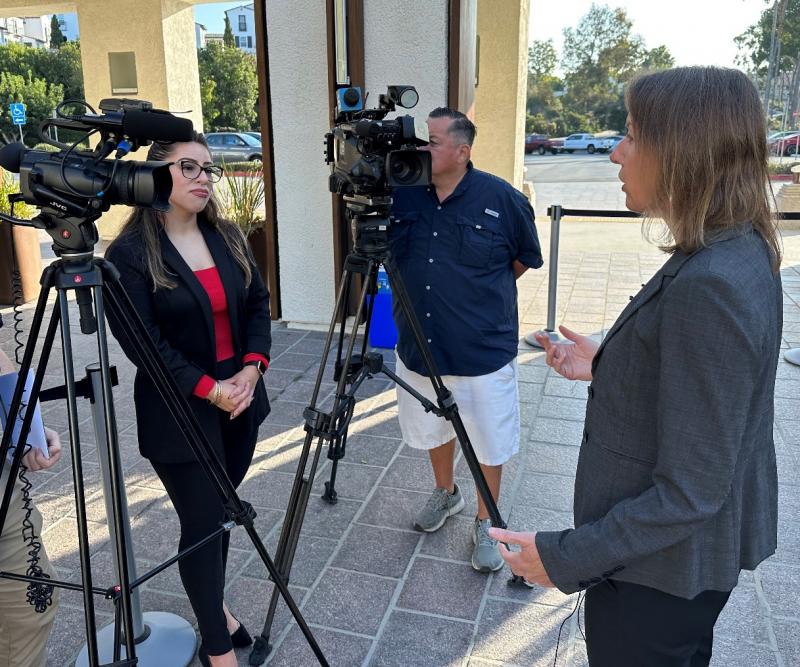 I talked with reporters about the importance of bringing everyone involved – all levels of government and nonprofits – together to find solutions.
I talked with reporters about the importance of bringing everyone involved – all levels of government and nonprofits – together to find solutions.
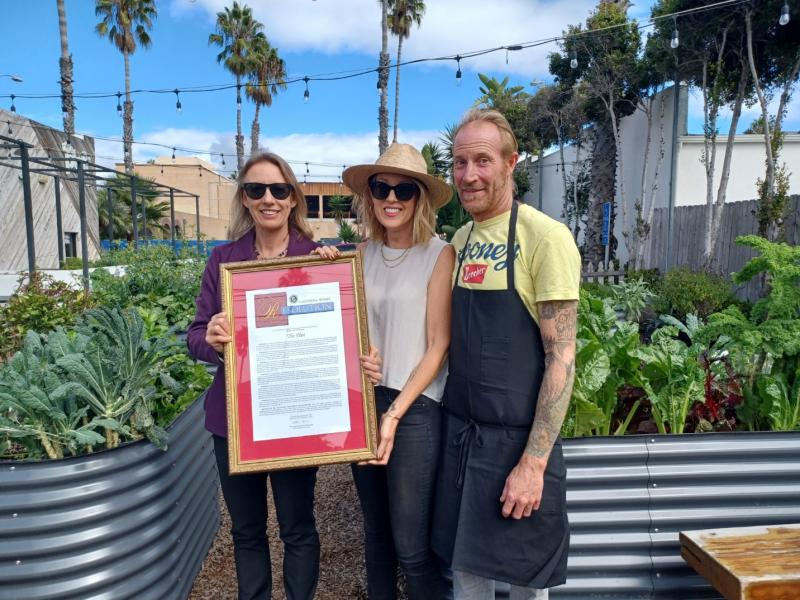 I presented Jessica and Davin Waite, co-owners of The Plot restaurant, with a Senate resolution designating their restaurant as Senate District 38 Small Business of the Year.
I presented Jessica and Davin Waite, co-owners of The Plot restaurant, with a Senate resolution designating their restaurant as Senate District 38 Small Business of the Year.
The critically acclaimed and award winning restaurant, which opened in 2020, is vegan and works to be completely sustainable, zero waste and regenerative in its business operations. The restaurant diverts 100 percent of waste from landfills, and less than 1 percent of the food product brought into the business is discarded.
The food is truly delicious and I love that they celebrate all aspects of being zero waste.
The restaurant goes the extra mile to be sustainable, including using produce from its garden whenever possible, getting additional ingredients from regenerative farms and making products in-house to reduce packaging.
All food waste is repurposed. For example, the restaurant uses tofu whey for caramel, beet scraps for ketchup and mushroom scraps, which are dried and smoked, to create the zesty taste for their house-made cheese. To-go boxes are compostable.
"Not only is it awesome to accept this award, but receiving it from a California Senator is extra special,” said Davin and Jessica Waite, the co-founders and co-owners of The Plot. “We are lucky to live in a state that recognizes and supports impact-driven businesses. We are excited about the opportunities that will become available as California transitions to a greener economy, and we are inspired by the challenge of continuing to raise the bar for our business."
Learn more about The Plot on its website, or read the San Diego Magazine review of the restaurant.
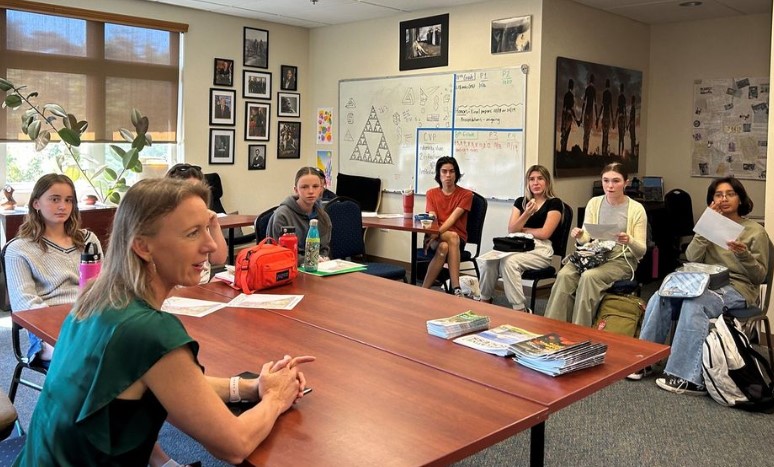
I was invited to share my experiences with young women about pursuing higher education, developing a strong mind, seeking leadership roles, and building one another up.
I enjoyed meeting with the Girl Rising Club at the Grauer School in Encinitas and sharing some of the challenges and rewards that I have experienced as a journalist, attorney, mayor and state senator.
The girls asked some great questions, such as how I made the decision to run for office and how being a woman affected my experiences. I encouraged them to lean into leadership opportunities whenever possible and to speak up so that their voices are heard. The silent participant in any room is not having any impact.
Also, it’s important for them to know that it’s entirely possible to succeed in careers traditionally dominated by men. We have not reached gender equity in leadership roles – sadly we have a long ways to go on that journey – but there are more doors open for girls and women in this country than ever before. So raise your hand and lean in to be a leader, even when it feels uncomfortable.
I was fortunate to have a role model in my mother, who still works an attorney. One of her favorite sayings: “There’s always room at the top for the best.” And I firmly believe that.
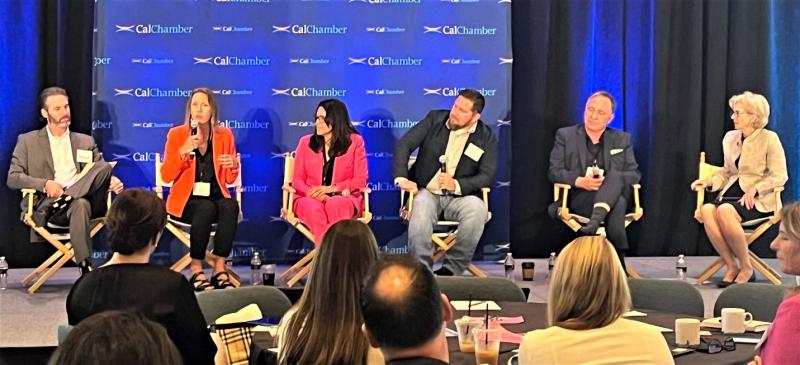 In the picture, left to right, are panel moderator Preston Young, myself, and Assemblymembers Blanca Pacheco, Juan Alanis, Rick Chavez Zbur and Diane Dixon.
In the picture, left to right, are panel moderator Preston Young, myself, and Assemblymembers Blanca Pacheco, Juan Alanis, Rick Chavez Zbur and Diane Dixon.
I was happy to talk about my experiences in my first year in the State Senate at CalChamber’s annual Public Affairs Conference, which was held in Dana Point. I participated in a panel discussion titled “New Kids on the Block” that featured freshmen legislators.
As I have shared in this newsletter, I have learned a lot and am proud of the six bills I authored that passed the Legislature and were signed into law by Gov. Gavin Newsom. But, that is just the start.
I am focused on working to end homelessness, eliminate gun violence, enhance transportation, improve sustainable living, protect the environment and counter climate change. There are so many challenges we are facing today in California – big problems to solve – and I am energized to tackle them.
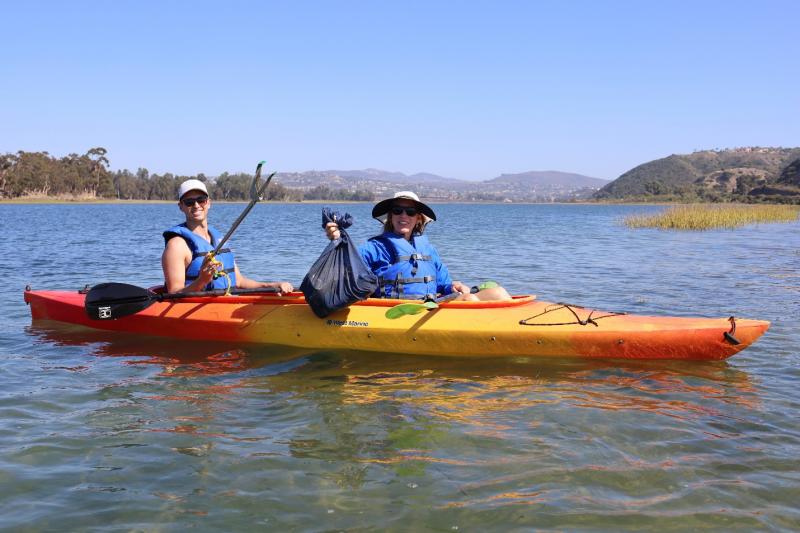
My District Director Jack Christensen and I joined scores of volunteers who came out for the 17th Annual Batiquitos Lagoon Kayak Fundraiser and Cleanup Event.
I was happy to paddle through Batiquitos Lagoon on a recent Saturday to collect trash alongside volunteers with the Batiquitos Lagoon Foundation. It was a great annual event that combined a wonderful outdoor activity with a fantastic civic activity, cleaning up our environment.
The Batiquitos Lagoon is a lovely 610-acre watershed in between the cities of Encinitas and Carlsbad that is enjoyable to hike beside or paddle through.
We all need to do our part to keep our communities and our environment beautiful and trash-free.
Watch a short video of my kayak cleanup here.
Learn more about the Batiquitos Lagoon Foundation here.
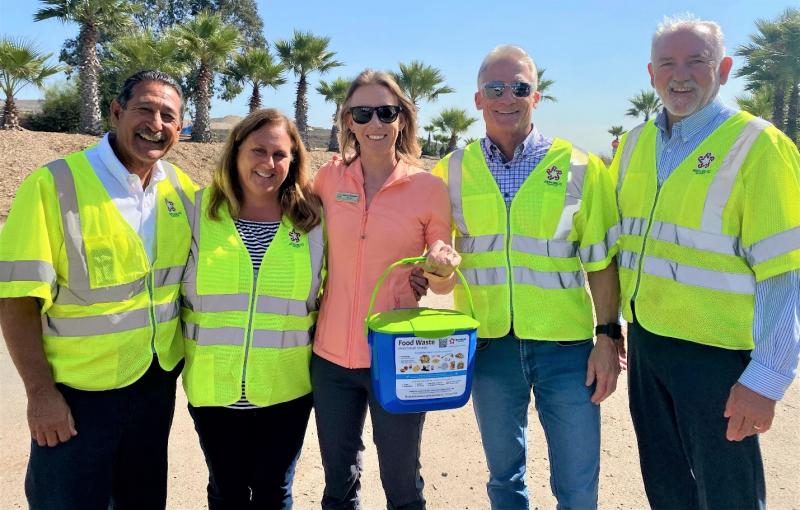
Pictured with me from Republic Services are, from left to right, Operations Manager Gabe Gonzales, Municipal Manger Risa Baron, Director Government Affairs Mike Caprio, and General Manager Neil Mohr.
I was impressed by my recent tour of the Republic Services Otay Landfill and Compost Facility in Chula Vista. I learned how they process the green waste generated by local homes and businesses.
Republic’s facilities can process about 100 tons of organic waste per day. It only takes the green waste eight weeks upon arrival at the facility to be converted into compost ready for use.
In the photo, I have a compost care package that comes from Republic’s great work. The state is entering a new era of resource recovery and it’s great to see innovators like Republic leading the way.
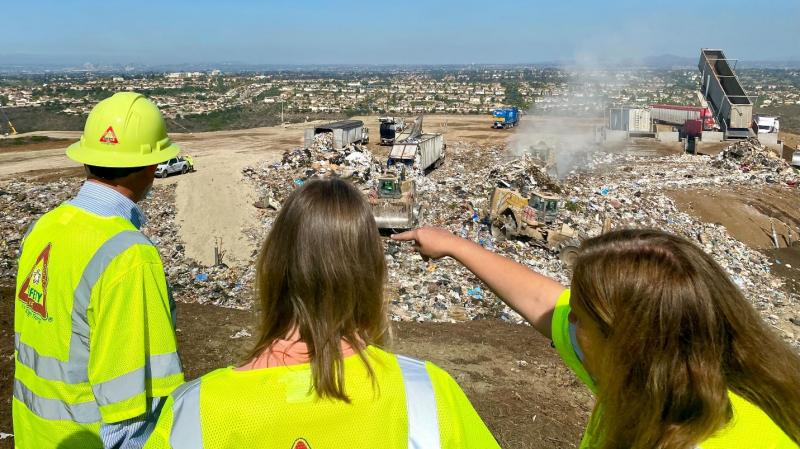
Here we’re looking at the landfill, not the compost.
I will be holding press conferences next week in Vista and Laguna Hills. Even if you are not a member of the media, you are welcome to attend! I was very glad I could get funding added to the state budget for these important community projects and services. Here are the details.
VISTA
Who:
- Senator Catherine Blakespear
- Vista City Officials
- Encinitas City Officials
What:
Sen. Blakespear presents $5 million to the City of Vista to fund an interim and
permanent supportive housing project for people experiencing homelessness or
who are at risk for homelessness in North San Diego County.
When:
10 a.m., Wednesday, November 8
Where:
2148 S. Santa Fe Avenue, Vista, CA 92084.
LAGUNA HILLS
Who:
- Senator Catherine Blakespear
- Age Well Officials
What:
Sen. Blakespear presents $510,000 check to Age Well of Orange County
to procure six additional hybrid, specialized transportation vehicles to provide non-emergency transportation services to medical appointments throughout Orange County to seniors and individuals with mobility challenges.
When:
10 a.m., Thursday, November 9
Where:
23721 Moulton Pkwy, Laguna Hills, CA 92653.
For many, the horrific terror attack and the subsequent carnage on October 7 against Israelis and the deaths from the invasion of Palestinian territory have had a direct impact. Many are grieving the loss of family and friends. We are all anxiously watching the horrors that are unfolding.
I condemn violence in all its forms and will continue to stand strong against anti-semitism and discrimination of all kinds.
As a State Senator, I don’t have a direct policy role in the U.S. response. I am interested in making sure my constituents get the support they need.
To that end, constituents should know that there are state grants available to nonprofit organizations for safety and facility hardening activities – to make physical security enhancements – for those at high risk of violent attacks or hate crimes due to ideology, beliefs, and mission. Find information on the grants here.
Also, a group of attorneys in San Diego is offering free legal services to defend the civil rights of local Jewish and Muslim community members who may be victimized because of tensions surrounding the deadly Israeli-Palestinian conflict in the Middle East.
Finally, FBI Director Christopher Wray warned this week in testimony to Congress that “the ongoing war in the Middle East has raised the threat of an attack against Americans in the United States to a whole other level.” All Americans should exercise greater vigilance and awareness of potential violence in the United States.
The loss of life, trauma and injuries both physical and mental that Israelis, the broader Jewish community, the Muslim community and Palestinians have experienced is absolutely horrible.
My staff and I are meeting with and receiving phone calls from community organizations and individuals. If there’s anything my office can do to support you or affected communities, please let me know.
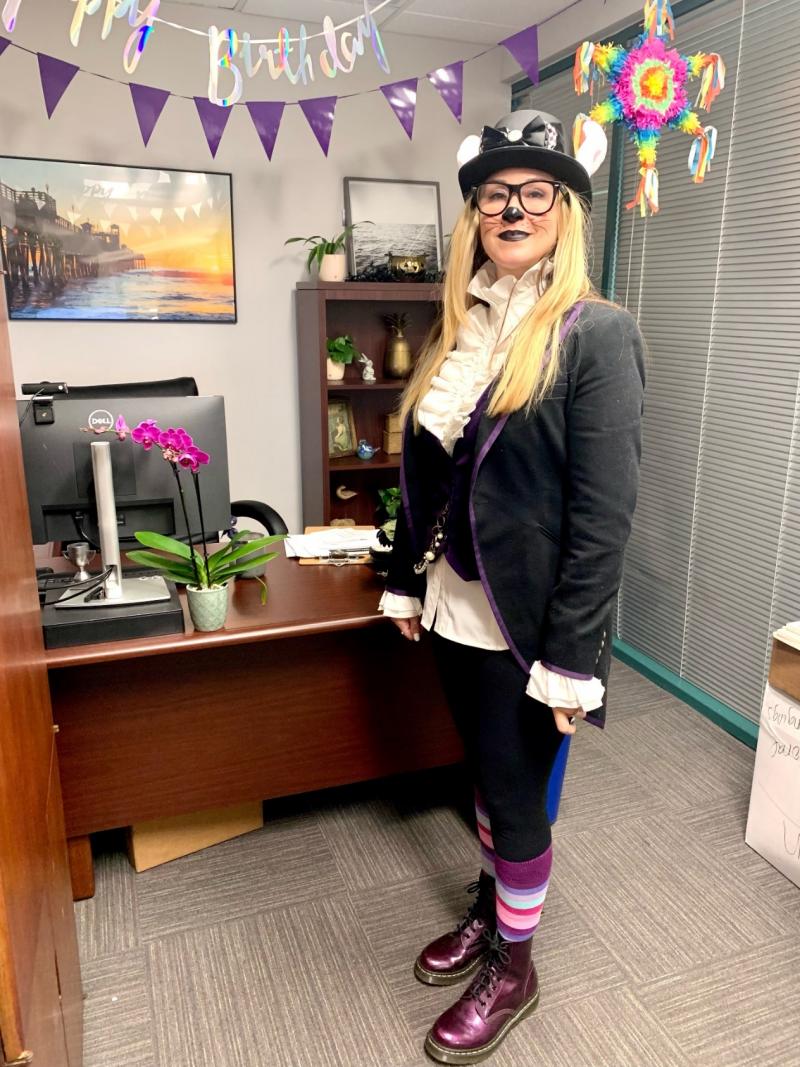
Jessica Linder on Halloween as Alice in Wonderland’s White Rabbit!
In the famous television series “M*A*S*H,“ the character Radar was the know-all, get it done, invaluable administrative assistant making sure the unit ran smoothly.
Team Blakespear’s Radar is Executive Assistant Jessica Linder, who works out of my Encinitas District Office and tackles any task – no matter how difficult or thankless – with grace and efficiency. Our office couldn’t run without her, and we’re so grateful to have her on our team.
She recently celebrated her birthday, and here’s to wishing Jessica the happiest of birthdays!
Along with everything on her plate, she keeps our office warm and inviting. She led staff in creating our office Halloween decorations. Thanks for all you do Jessica!

Halloween art created by our district staff.
In partnership,

CONTACT INFO
To learn more about what I am doing, follow me on social media.
Email me at Senator.Blakespear@Senate.ca.gov
Call my Encinitas district office at (760) 642-0809
Call my Laguna Hills district office at (949) 598-5850
Call my Capitol office in Sacramento at (916) 651-4038


